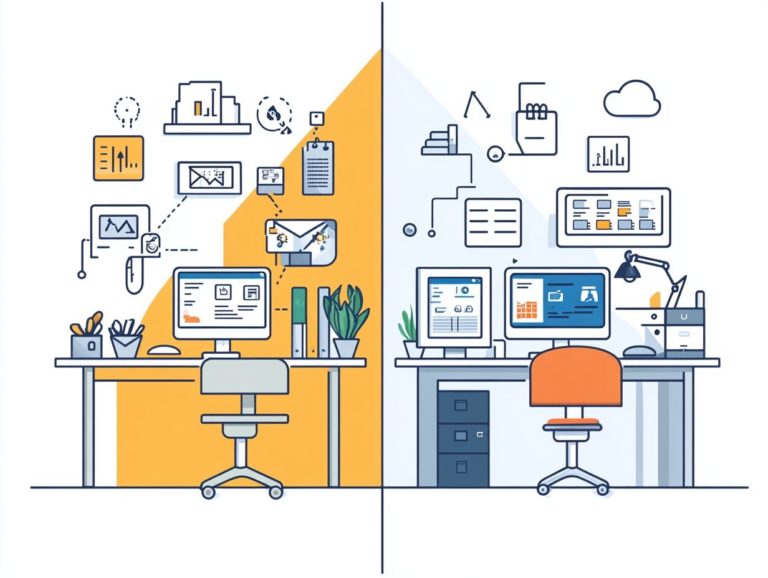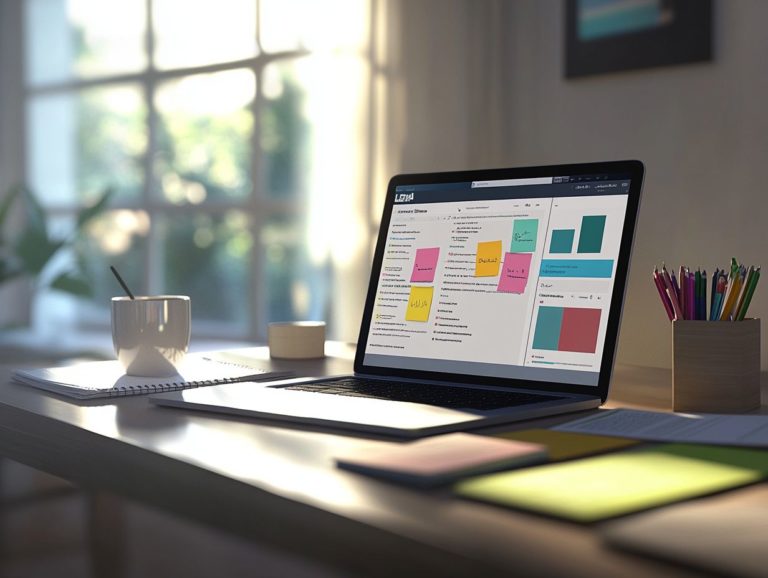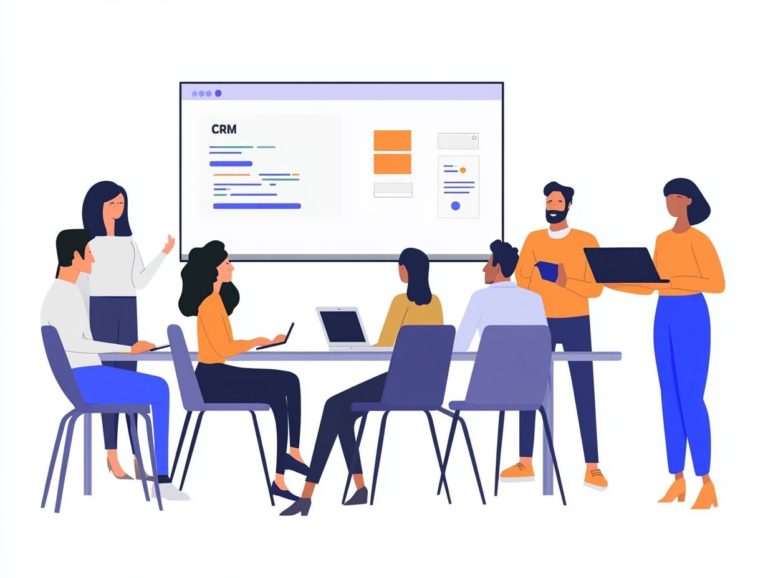How to Deal with Data Privacy in CRM
In today s digital landscape, safeguarding customer information is not just important; it s essential, particularly within Customer Relationship Management (CRM) systems.
By understanding data privacy in CRM, you can protect sensitive information and ensure compliance with ever-evolving regulations. This exploration will delve into the significance of data privacy, addressing common concerns such as data breaches and unauthorized access, along with best practices for maintaining robust security measures.
We will also cover how to effectively respond to data privacy issues and what the future may hold for CRM data protection. Navigate these critical aspects of data privacy in CRM with us, and empower yourself to stay ahead in this rapidly changing environment!
Contents
- Key Takeaways:
- Understanding Data Privacy in CRM
- Importance of Data Privacy in CRM
- Common Data Privacy Concerns in CRM
- Best Practices for Data Privacy in CRM
- Dealing with Data Privacy Issues in CRM
- Future of Data Privacy in CRM
- Preguntas Frecuentes
- Qu es CRM y por qu es importante la privacidad de los datos en l?
- C mo puedo asegurar el cumplimiento de las regulaciones de privacidad de datos en mi CRM?
- Cu les son algunos riesgos comunes de privacidad de datos en CRM?
- Es necesario obtener el consentimiento de los clientes para recopilar y almacenar sus datos en CRM?
- C mo puedo asegurar la seguridad de los datos de los clientes en mi CRM?
- Qu debo hacer en caso de una violaci n de datos en mi CRM?
Key Takeaways:

Prioritize customer data protection in CRM to build trust and maintain compliance with regulations. Implement strong security measures and regularly update privacy policies to mitigate risks and address data privacy concerns. Be prepared to respond to data breaches and handle customer data requests effectively to safeguard data privacy in CRM.
Understanding Data Privacy in CRM
Understanding data privacy in Customer Relationship Management (CRM) is essential for your business today. It involves the protocols and practices that protect sensitive customer information, ensuring compliance with regulations like GDPR (General Data Protection Regulation) and CCPA (California Consumer Privacy Act), all while building customer trust.
By implementing effective data management and protection strategies, you not only reduce the risks of data breaches but also enhance overall data security. This, in turn, strengthens your relationship with customers.
As you increasingly rely on CRM systems to manage customer interactions and confidential business information, gaining a deep understanding of data privacy becomes crucial for sustaining customer loyalty and keeping up with evolving data protection regulations.
What is Data Privacy in CRM?
Data privacy in CRM encompasses the policies and practices you put in place to guard customer data against unauthorized access and breaches. It also ensures that sensitive information is handled and stored properly.
This concept is crucial, especially in a world where vast amounts of customer data are gathered every single day. Mishandling this information can lead to a loss of customer trust and hefty financial fallout.
You should make data encryption a top priority; it scrambles your data, making it completely unreadable without the right decryption keys. Strengthening your security protocols with regular audits and comprehensive employee training will further enhance the integrity of your customer data.
By prioritizing these measures, you re not just staying compliant with legal standards; you’re also boosting your reputation in a competitive marketplace.
Importance of Data Privacy in CRM
The significance of data privacy in CRM is paramount. It directly influences your customer interactions, fosters trust, and ensures compliance with stringent data protection regulations.
This, in turn, shapes your company’s reputation and is crucial for achieving success in a competitive landscape.
Protecting Customer Information
Protecting customer information isn’t just an option it’s a vital necessity for your business. Organizations like yours need to implement robust security protocols think data encryption and regular security audits to prevent data breaches and safeguard sensitive information.
To keep that sensitive data secure, it s essential to adopt a multi-layered approach. This means incorporating firewalls, intrusion detection systems, and comprehensive access controls. Data encryption is your best friend here, converting information into a secure format that only authorized personnel can interpret.
This effectively renders it useless to anyone trying to gain unauthorized access. Regular audits are essential for your security strategy. These assessments help you identify and address potential vulnerabilities, ensuring that your security measures evolve as new threats emerge.
By committing to these best practices, you can foster greater trust among your clientele while significantly minimizing the risks associated with data exposure. Take these steps now to protect your customer data and build lasting trust!
Complying with Regulations
Complying with data protection regulations like GDPR and CCPA is crucial if you re using CRM systems. It ensures that you handle customer data responsibly and transparently, safeguarding against costly penalties while enhancing customer trust.
You need to implement specific measures, such as:
- Obtaining explicit consent from customers before collecting their data,
- Granting them the right to access and delete their information,
- Ensuring secure data storage.
By following these rules, you reduce the risk of hefty fines and build customer trust. Regular security audits are essential! They help you identify vulnerabilities, keep your data handling processes up to date, and show your commitment to protecting customer information.
Common Data Privacy Concerns in CRM
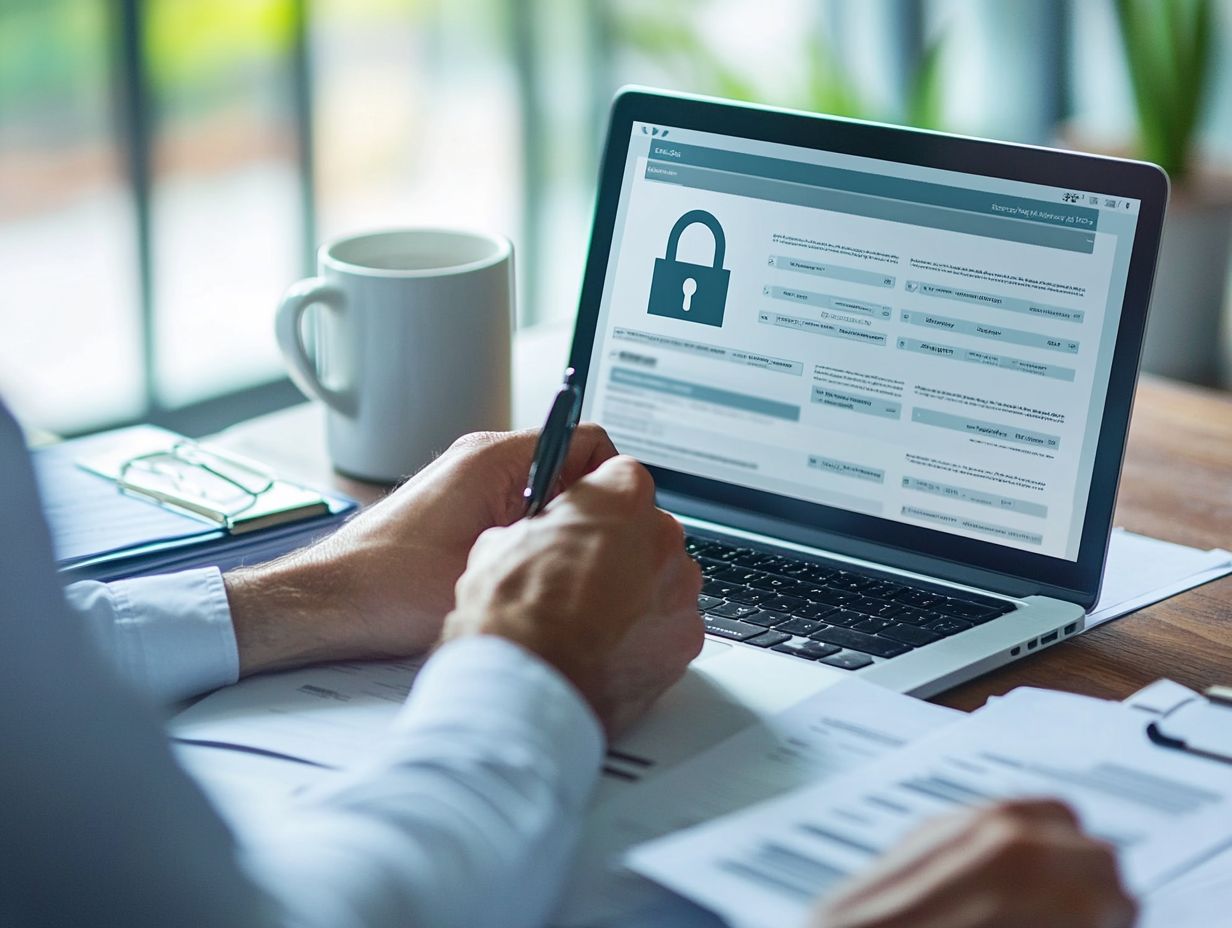
In CRM systems, you must navigate common data privacy concerns. Risks of data breaches, unauthorized access, and various security vulnerabilities threaten to erode customer trust and expose your organization to legal repercussions.
You must act now to protect your data! Staying vigilant and proactive in addressing these challenges maintains the integrity of your data and the confidence of your clients.
Data Breaches
Data breaches can jeopardize customer data, leading to serious repercussions. This reality underscores the need for strong security measures and a comprehensive incident response plan to mitigate potential damage.
These breaches often involve unauthorized access to sensitive information, including personal identification details, financial records, and proprietary business data. The fallout doesn’t stop at immediate financial losses; you may also face legal consequences and regulatory fines that strain your resources.
When customers discover that their personal data has been compromised, their trust in your organization diminishes. This ultimately impacts long-term relationships and loyalty.
Adopting best practices for incident response is essential. Develop a clear communication strategy, conduct regular security audits, and prioritize staff training to ensure that everyone can recognize and report suspicious activities.
Unauthorized access to sensitive customer data in CRM systems presents a significant risk. Stringent access permissions and robust user authentication protocols protect your valuable information.
Without proper safeguards, you face financial losses and reputational damage that could take years to mend. Ensuring that only authorized personnel can access specific data is essential for maintaining customer trust and complying with regulations.
Implementing strong user authentication methods, like multi-factor authentication (requiring users to verify their identity in more than one way), drastically reduces the likelihood of breaches. This strategy enhances security and cultivates a sense of responsibility among your employees.
By prioritizing effective access control measures, your organization can create a more secure environment, safeguarding sensitive information from unauthorized intrusion.
Best Practices for Data Privacy in CRM
Implementing best practices for data privacy in your CRM is crucial for safeguarding customer information and ensuring GDPR compliance with regulations.
This approach protects sensitive data and cultivates a culture of security awareness among your employees, enabling them to prioritize data integrity at every level.
Implementing Strong Security Measures
Strong security measures protect your data in a CRM. Regular risk assessments and training about online safety are vital.
Use advanced tools like firewalls to monitor traffic. Applying encryption is also important to safeguard sensitive data, whether in transit or at rest.
It is equally important to foster a culture of awareness among employees. Consistent training sessions help your team recognize suspicious activities and respond effectively.
By prioritizing these strategies, you mitigate risks and create a secure environment for your valuable customer information.
Regularly Updating Privacy Policies
Update your privacy policies regularly. This keeps you compliant with data regulations.
These updates build trust and show your commitment to protecting personal information. They clarify how data is collected, used, and safeguarded.
As laws evolve, staying informed ensures your practices align with legal standards, reducing the risk of penalties.
Regular security audits are essential! They verify that your data protection measures are effective and compliant, enhancing your overall security posture.
This proactive approach protects sensitive information and cultivates accountability and trust among your consumers.
Dealing with Data Privacy Issues in CRM

Navigating data privacy challenges in CRM demands robust strategies. You must tackle potential data breaches, respond to customer data requests, and ensure compliance with data protection regulations, including understanding how to maintain data privacy in CRM software.
By taking these proactive measures, you safeguard your organization s integrity and build lasting trust with your customers.
Responding to Data Breaches
Acting quickly during data breaches is crucial! A strong response plan minimizes damage and protects customer trust.
Start by activating your incident response team, ensuring they are trained for these high-stakes situations. Swift communication is essential not just within your team, but also with affected individuals and stakeholders.
Once you contain the breach, assess its impact on your operations and customer data. Finally, conduct post-incident security audits; these are essential for identifying vulnerabilities and establishing preventive measures.
This reinforces your organization s commitment to safeguarding sensitive information moving forward.
Handling Customer Data Requests
Responding to customer data requests is vital for trust. Ensure compliance with data protection regulations by responding promptly and transparently.
Establish a clear protocol for managing these inquiries. Designate a responsible team to handle requests and ensure they understand relevant laws like the General Data Protection Regulation (GDPR) and California Consumer Privacy Act (CCPA).
- Timely acknowledgment of each request reassures customers that their concerns are taken seriously.
- Regular training sessions equip your staff with the skills to address requests effectively.
By communicating transparently about procedures and timelines, you enhance trust and transparency in your interactions with customers.
Future of Data Privacy in CRM
The future of data privacy in CRM looks exciting! It will evolve, shaped by emerging trends in data protection regulations, advancements in cybersecurity training, and a growing emphasis on customer trust and transparency in data handling.
Staying informed and proactive is essential as you navigate this landscape, ensuring your practices align with these transformative changes.
Trends and Predictions
Trends and predictions for data privacy indicate that organizations will increasingly prioritize compliance with evolving data protection regulations. They are expected to invest in advanced cybersecurity measures to safeguard customer information.
As businesses navigate a landscape defined by strict laws and rising consumer expectations, embracing automated cybersecurity solutions becomes essential. This shift streamlines data protection efforts and allows for swift responses to potential threats.
Building customer trust is vital for effective data privacy strategies. Consumers are more likely to share personal information with organizations that demonstrate a strong commitment to protecting their data.
By combining compliance with transparency and leveraging technological advancements, you can build a strong base for a secure and trustworthy relationship with your clients.
Preguntas Frecuentes
Qu es CRM y por qu es importante la privacidad de los datos en l?
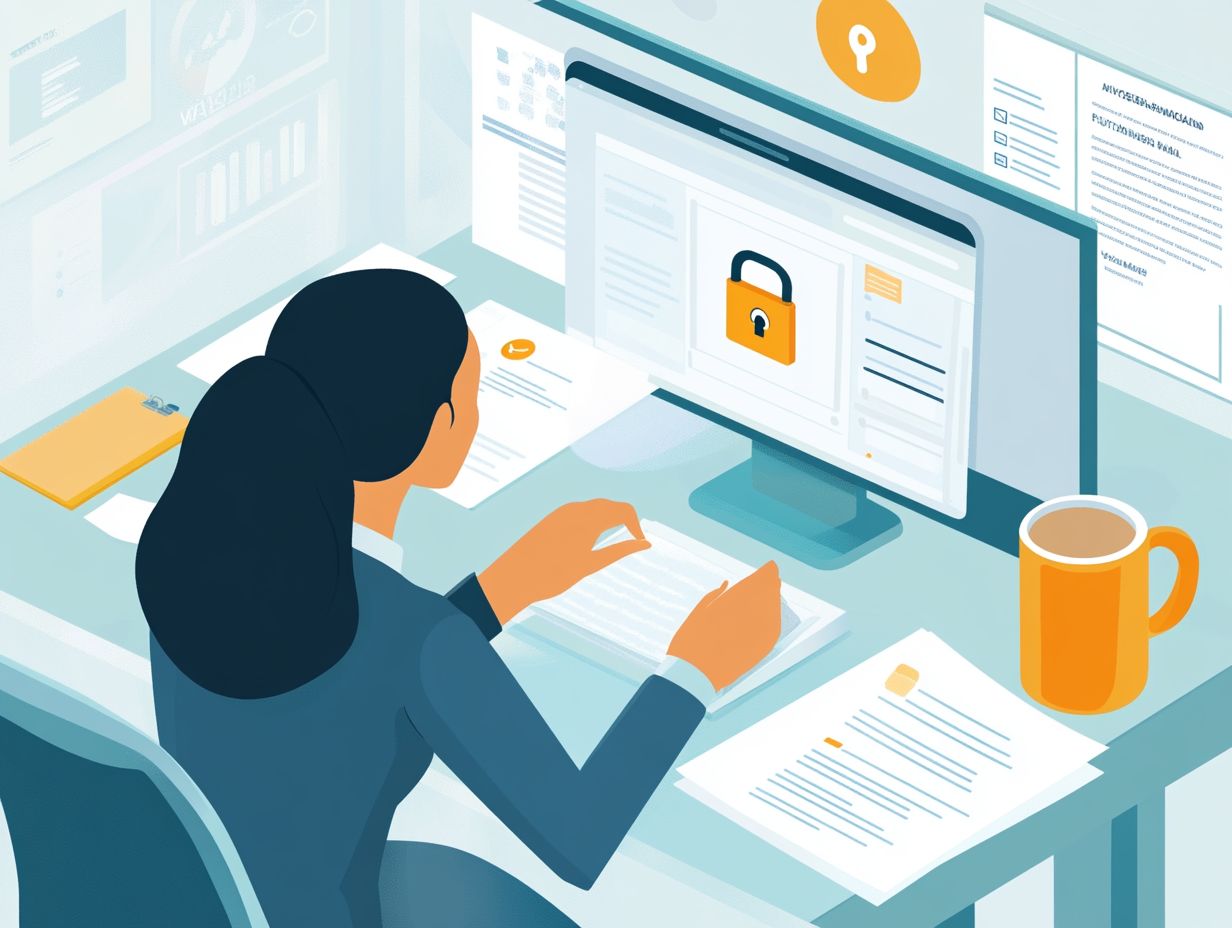
CRM (Gesti n de Relaciones con Clientes) es una herramienta utilizada para gestionar interacciones y relaciones con los clientes. La privacidad de los datos es crucial en CRM porque implica el manejo de informaci n sensible, como detalles personales, historial de compras y registros de comunicaci n de los clientes.
Proteger estos datos es esencial para mantener la confianza y construir relaciones s lidas con los clientes.
C mo puedo asegurar el cumplimiento de las regulaciones de privacidad de datos en mi CRM?
Para asegurar el cumplimiento de las regulaciones de privacidad de datos, es fundamental comprender las leyes y regulaciones relacionadas con la privacidad de datos en su industria y ubicaci n. Implemente medidas adecuadas de protecci n de datos, revise y actualice regularmente sus pol ticas de privacidad, y capacite a los empleados sobre las mejores pr cticas de privacidad de datos.
Cu les son algunos riesgos comunes de privacidad de datos en CRM?
Algunos riesgos comunes de privacidad de datos en CRM incluyen el acceso no autorizado a los datos de los clientes, violaciones de datos, p rdida de datos y mal uso de la informaci n de los clientes.
Estos riesgos pueden tener consecuencias graves, como sanciones legales, p rdida de confianza de los clientes y da o a la reputaci n de su empresa.
Es necesario obtener el consentimiento de los clientes para recopilar y almacenar sus datos en CRM?
S , es necesario obtener el consentimiento de los clientes antes de recopilar y almacenar sus datos en CRM. Esto es requerido por la mayor a de las leyes y regulaciones de privacidad de datos y asegura que los clientes est n informados y de acuerdo con el uso dado a sus datos.
C mo puedo asegurar la seguridad de los datos de los clientes en mi CRM?
Para garantizar la seguridad de los datos de los clientes en su CRM, implemente medidas como cifrado de datos, controles de acceso, copias de seguridad regulares y almacenamiento seguro. Tambi n es importante revisar y actualizar regularmente los protocolos de seguridad y capacitar a los empleados sobre las mejores pr cticas de seguridad de datos.
Qu debo hacer en caso de una violaci n de datos en mi CRM?
En caso de una violaci n de datos en su CRM, tome medidas inmediatas para contener la violaci n, evaluar el da o y notificar a las autoridades correspondientes y a los clientes afectados. Adem s, es crucial revisar y actualizar sus medidas de seguridad para prevenir futuras violaciones.
Tome acci n hoy mismo para proteger los datos de sus clientes!



